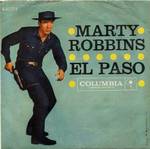El Paso (song)
| "El Paso" | |||||||||
|---|---|---|---|---|---|---|---|---|---|

El Paso by Marty Robbins
|
|||||||||
| Single by Marty Robbins | |||||||||
| from the album Gunfighter Ballads and Trail Songs | |||||||||
| B-side | "Running Gun" | ||||||||
| Released | October 26, 1959 | ||||||||
| Format | 7" | ||||||||
| Recorded | April 1959 | ||||||||
| Genre | Country, Tex-Mex | ||||||||
| Length | 4:38 | ||||||||
| Label | Columbia | ||||||||
| Writer(s) | Marty Robbins | ||||||||
| Producer(s) | Don Law | ||||||||
| Marty Robbins singles chronology | |||||||||
|
|||||||||
|
|||||||||
"El Paso" is a country and western ballad written and originally recorded by Marty Robbins, and first released on Gunfighter Ballads and Trail Songs in September 1959. It was released as a single the following month, and became a major hit on both the country and pop music charts, reaching number one in both at the start of 1960. It won the Grammy Award for Best Country & Western Recording in 1961, and remains Robbins' best-known song. It is widely considered a genre classic for its gripping narrative which ends in the death of its protagonist, its shift from past to present tense, haunting harmonies by vocalists Bobby Sykes and Jim Glaser (of the Glaser Brothers) and the eloquent and varied Spanish guitar accompaniment by Grady Martin that lends the recording a distinctive Tex-Mex feel. The name of the character Faleena was based upon a schoolmate of Robbins in the fifth grade—Fidelina Martinez.
Members of the Western Writers of America chose El Paso as one of the Top 100 Western songs of all time.
"El Paso" was, at 4 minutes and 38 seconds in duration, far longer than most contemporary singles at the time. Robbins' record company was unsure whether radio stations would play such a long song, and so released two versions of the song on a promo 45: the full-length version on one side, and an edited version on the other which was nearer to the three-minute mark. The full-length version was overwhelmingly preferred.
The song is a first-person narrative told by a cowboy who is in El Paso, Texas, in the days of the Wild West. He recalls how he fell in love with a young Mexican woman, Faleena, a dancer at "Rosa's Cantina". When another cowboy made advances on "wicked Faleena", the narrator demanded that the other cowboy draw his gun; when the other cowboy did so, he gunned down the challenger, then fled El Paso for fear of being hanged for murder or killed in revenge by his victim's friends. (The truncated version of the song, often found on compilations, omits a verse in which the narrator expresses shock and remorse over the killing before realizing he has to flee.) In the act of fleeing, he commits the additional and potentially hanging offense of horse theft ("I caught a good one, it looked like it could run"), further sealing his fate in El Paso. Exiting El Paso, he hides out in the "badlands of New Mexico".
...
Wikipedia
